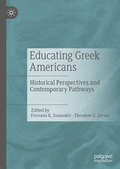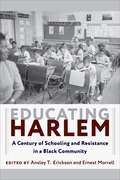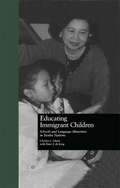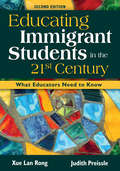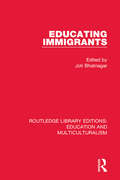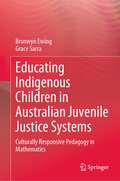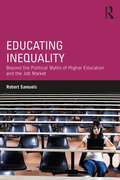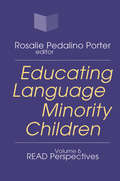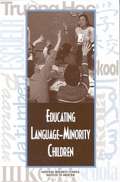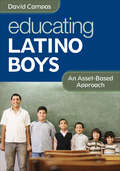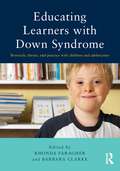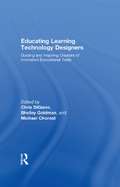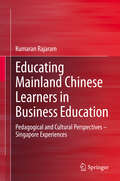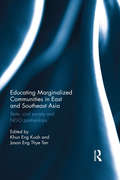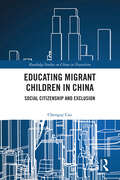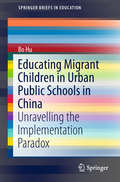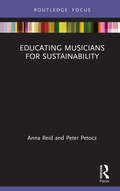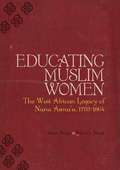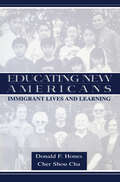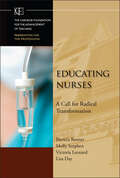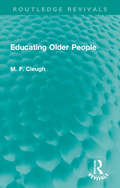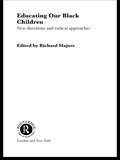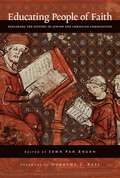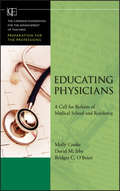- Table View
- List View
Educating Greek Americans: Historical Perspectives and Contemporary Pathways
by Theodore G. Zervas Fevronia K. SoumakisThis edited collection considers Greek American formal and informal educational efforts, institutions, and programs, broadly conceived, as they evolved over time throughout the United States. The book’s focus on Greek Americans aims to highlight the vast array of educational responses to local needs and contexts as this distinct, yet, heterogeneous immigrant community sought to maintain its linguistic, cultural, and religious heritage for over one hundred years. The chapters in this volume amend the scholarly literature that thus far has not only overlooked Greek American educational initiatives, but has also neglected to recognize and analyze the community’s persistence in sustaining them. This book is an important contribution to an understanding of Greek Americans’ long overdue history as a significant diaspora community within an American context.
Educating Harlem: A Century of Schooling and Resistance in a Black Community
by Ernest Morrell Ansley T. EricksonOver the course of the twentieth century, education was a key site for envisioning opportunities for African Americans, but the very schools they attended sometimes acted as obstacles to black flourishing. Educating Harlem brings together a multidisciplinary group of scholars to provide a broad consideration of the history of schooling in perhaps the nation’s most iconic black community.The volume traces the varied ways that Harlem residents defined and pursued educational justice for their children and community despite consistent neglect and structural oppression. Contributors investigate the individuals, organizations, and initiatives that fostered educational visions, underscoring their breadth, variety, and persistence. Their essays span the century, from the Great Migration and the Harlem Renaissance through the 1970s fiscal crisis and up to the present. They tell the stories of Harlem residents from a wide variety of social positions and life experiences, from young children to expert researchers to neighborhood mothers and ambitious institution builders who imagined a dynamic array of possibilities from modest improvements to radical reshaping of their schools. Representing many disciplinary perspectives, the chapters examine a range of topics including architecture, literature, film, youth and adult organizing, employment, and city politics. Challenging the conventional rise-and-fall narratives found in many urban histories, the book tells a story of persistent struggle in each phase of the twentieth century. Educating Harlem paints a nuanced portrait of education in a storied community and brings much-needed historical context to one of the most embattled educational spaces today.
Educating Immigrant Children: Schools and Language Minorities in Twelve Nations (Reference Books In International Educationreference Books In International Education Series)
by Charles L. Glenn Ester J. De JongFirst published in 1996. Routledge is an imprint of Taylor & Francis, an informa company.
Educating Immigrant Students in the 21st Century: What Educators Need to Know
by Xue Lan Rong Judith PreissleThis comprehensive new edition clarifies current demographic data on immigration, addresses factors that influence linguistic transition and achievement, and explores evidence-based practices and policies.
Educating Immigrants (Routledge Library Editions: Education and Multiculturalism #1)
by Joti BhatnagarOriginally published in 1981. Immigrant children often have significant ethnic, linguistic and cultural differences from children of the host country and require special teaching arrangements. This book is a country-by-country survey of this problem. Each chapter begins by examining the general background to the problem, outlining the nature and extent of immigration in the country in question, and portraying the relationships between immigrant groups and the indigenous population. Each chapter then considers how children’s academic performance, social relations, self-esteem and academic and vocational expectations are affected by their immigrant status, and concludes by describing and analysing the special educational programmes adopted to help immigrant children.
Educating Indigenous Children in Australian Juvenile Justice Systems: Culturally Responsive Pedagogy in Mathematics
by Bronwyn Ewing Grace SarraThis book addresses key issues in the context of the national policy of educating children accused of crimes in Juvenile Courts in Australia. For several decades, National and State Governments in Australia have struggled to define education, constantly seeking to improve the way society applies the concept. This book presents an accurate portrayal of consequences of the education policy of trying to educate troubled children and young people in trouble with the law. It describes the work of juvenile detention centre mathematics teachers and their teaching contexts. It portrays teachers as learners, who ventured with researchers with a theoretical perspective. This book focuses on culturally responsive pedagogies that seek to understand the ways Indigenous children and young people in juvenile detention make sense of their mathematical learning, which, until the time of detention, has been plagued by failure. It examines how the underperformance of Aboriginal and Torres Strait Islander students, and students from low socioeconomic backgrounds are strong determinants of their overrepresentation in the juvenile justice system in Australia. This book presents the argument that if the students’ literacy and numeracy levels can be improved, there is opportunity to build better futures away from involvement in the juvenile justice system and towards productive employment to improve life chances.
Educating Inequality: Beyond the Political Myths of Higher Education and the Job Market
by Robert SamuelsPoliticians and school officials often argue that higher education is the solution to many of our social, and economic problems. Educating Inequality argues that in order to reduce inequality and enhance social mobility, public policies are needed to revamp the financial aid system and increase the number of good jobs. Exploring topics such as the fairness of the current social system, the focus on individual competition in an unequal society, and democracy and capitalism in higher education, this important book seeks to uncover the major myths that shape how people view higher education and its relation to the economy. Looking to models that generate economic mobility and social equality, this book advocates a broader vision for public higher education to promote universal equality and global awareness.
Educating Language Minority Children
by Rosalie PorterREAD Perspectives, a refereed annual publication of the Institute for Research in English Acquisition and Development (READ), Washington, D.C., begins its sixth year with the theme "Educating Language Minority Children: An Agenda for the Future." Volume 6 features presentations from a Boston University conference organized by READ and the Pioneer Institute. The essays represent truly diverse viewpoints on the education of limited-English students, rare in the complex and contentious arena of bilingual education.The lead article, "Rethinking Bilingual Education," by Charles L Glenn of Boston University, inspired the conference's organization. Dr. Glenn proposes new ways of schooling limited-English-speaking children that depart dramatically from the practices of the past 30 years. He proposes sound recommendations for revising Massachusetts bilingual education law, ideas that could well be applied in other states. Also included areChristine Rossell's "Mystery on the Bilingual Express," a critique of the controversial study by Thomas and Collier; Rosalie Pedalino Porter's follow-up review of El Paso, Texas's programs for English learners; Mark Lopez's "Labor Market Effects of Bilingual Education"; "Bethlehem, Pennsylvania's English Acquisition Program," by Thomas J. Dolusio; Maria Estela Brisk's discussion on the need to restructure schools to incorporate the large non-English student population; several articles regarding educational reform in Massachusetts, including two by school superintendents Eugene Creedon and Douglas Sears, and one by Harold Lane, Chairman of the Joint Education Committee in the Massachusetts Legislature; and, finally, Kevin Clark's "From Primary Language Instruction to English Immersion: How Five California Districts Made the Switch." Kevin Clark's California study "From Primary Language Instruction to English Immersion: How Five California Districts Made the Switch," describes how radical changes are being carried out in a few representative school districts since passage of California Proposition 227, the "English for the Children" initiative. Educating Language Minority Children is a valuable selection of the most current thinking on policies, programs, and practices affecting limited-English students in U.S. public schools. It provides a wealth of practical information useful to educators, parents, legislators, and policy analysts, and is an essential addition to libraries nationwide.
Educating Language-Minority Children
by Committee on Developing a Research Agenda on the Education of Limited-English-Proficient Bilingual StudentsIn the past 30 years, a large and growing number of students in U.S. schools have come from homes in which the language background is other than English. These students present unique challenges for America's education system.Based on Improving Schooling for Language-Minority Children, a comprehensive study published in 1997, this book summarizes for teachers and education policymakers what has been learned over the past three decades about educating such students. It discusses a broad range of educational issues: how students learn a second language; how reading and writing skills develop in the first and second languages; how information on specific subjects (for example, biology) is stored and learned and the implications for second-language learners; how social and motivational factors affect learning for English-language learners; how the English proficiency and subject matter knowledge of English-language learners are assessed; and what is known about the attributes of effective schools and classrooms that serve English-language learners.
Educating Latino Boys: An Asset-Based Approach
by Dr David CamposBring out the best in your male Latino students! Largely misunderstood and often underserved, Latino boys miss out on key academic opportunities that hinder their achievement and success in school and beyond. Educator David Campos, a champion of higher education for Latino boys, provides strategies to promote success for Latino boys. This book demonstrates how to: Enhance engagement and achievement by addressing Latino boys' needs Explore personal and school-wide beliefs to better understand how to serve this population Develop strategies for motivating Latino boys to pursue higher education Address challenges that Latino boys face in the home and at school
Educating Learners with Down Syndrome: Research, theory, and practice with children and adolescents
by Barbara Clarke Rhonda FaragherFor individuals with Down syndrome, the extent of the effect of intellectual disability depends largely on the degree of provision of appropriate support and intervention. In Educating Learners with Down Syndrome, editors Rhonda Faragher and Barbara Clarke have brought together a number of expert contributors, whose chapters review recent findings in the field of DS education, highlight promising practices, and identify areas for future research. While the emphasis is primarily on the school years, links to early intervention and to life post-16 are made, with chapters organized into three parts: conceptual overview of issues in learning and teaching, learning mathematics, and literacy development. The book is also united by the cohesive themes of assessment, evidence-based practice, and inclusive practices. Educating Learners with Down Syndrome importantly incorporates the voices of individuals with Down syndrome, whose personal narratives add significance to the research mission of the text and demonstrate the authors' inclusive philosophy. Aimed at researchers, teacher educators, higher degree students, and policy makers, this book is the first of its kind to provide a compendium of research on educating learners with Down syndrome.
Educating Learning Technology Designers: Guiding and Inspiring Creators of Innovative Educational Tools
by Michael Chorost Shelley Goldman Chris DiGianoWhat knowledge and skills do designers of learning technologies need? What is the best way to train them to create high-quality educational technologies? Distilling the wisdom of expert instructors and designers, this cutting-edge guide offers a clear, accessible balance of theory and practical examples. This cutting-edge guide: synthesizes learning, instructional design, and educational technology perspectives on learning-centered technology — highlighting how interdisciplinary work is driving the fields of the learning sciences and technology design and development offers helpful resources for both faculty and students — including descriptions of a variety of successful courses in learning technology design, examples of student work with commentary by instructors and students, and discussions of "lessons learned" in course development includes a "To the Student" chapter that speaks in plain language about what is exciting and challenging about creating technology for kids Directed to university instructors working with students on developing educational software projects and to managers leading learning technologies development teams, this book is a valuable resource for guiding and inspiring the next generation of designers of learning technologies.
Educating Mainland Chinese Learners in Business Education: Pedagogical and Cultural Perspectives – Singapore Experiences
by Kumaran RajaramThis book presents strategies and practices for facilitating effective learning for mainland Chinese students in western based education – regarding e.g. the choice of instructional techniques, attention to students’ cultural dislocation aspects, comfort, familiarity, and ease of knowledge transfer. It embeds innovativeness at a conceptual level, and argues for a holistic and “engaged” approach to learning effectiveness for mainland Chinese students.
Educating Marginalized Communities in East and Southeast Asia: State, civil society and NGO partnerships
by Khun Eng Kuah Jason Eng Thye TanDespite the enshrinement by the United Nations in 1948 of education as a universal human right, and despite the ideals espoused in the Education for All declaration in Dakar in 1990, it is patently clear that these ideals remain far from realized for a substantial portion of humankind. Especially at risk are vulnerable segments of society such as women, migrants, refugees, rural populations, ethnic minorities, and the financially disadvantaged. This book centres on efforts to provide education to these marginalized populations in the East and Southeast Asian region. Of particular interest are questions of financing and control. As various governments have struggled to manage the escalating costs of building schools, training teachers and educating students, the topic of public private partnerships in educational provision has assumed growing importance. The seven chapters presented here highlight a variety of partnerships among state, civil society and non-government organisations (NGOs).
Educating Migrant Children in China: Social Citizenship and Exclusion (Routledge Studies on China in Transition)
by Chengqi CaoThis book explores social citizenship through the lens of investigating local compulsory education policy targeting migrant children in Beijing and Guangzhou.Deploying a multi-case methodology, this book illustrates how these two local governments respond to central decisions on compulsory education for migrant children, the implementation models they employ and the impact of this unique practice on social citizenship boundary redefinition through single- and cross-case analysis. It helps readers understand the evolution of compulsory education policy and its effects on access to schooling for migrant children and clearly illustrates this policy’s implications for social citizenship.Revealing the important relationship between the central and lower levels of government in China, this book will appeal to students and scholars of education, social policy, as well as those with an interest in Chinese culture and society.
Educating Migrant Children in Urban Public Schools in China: Unravelling the Implementation Paradox (SpringerBriefs in Education)
by Bo HuThis book investigates the implementation of the education policy for migrant children, arguing that it has been selectively implemented: while some policy themes have been effectively implemented, others have not. Four factors underlie this selective implementation: specificity of policy goals, funding for education, local incentives in an exam-oriented education system, and intergroup relationships between migrant and urban children.
Educating Musicians for Sustainability (ISME Series in Music Education)
by Anna Reid Peter PetoczEducating Musicians for Sustainability explores the intersections of sustainability and music, investigating how sustainability affects the development and professional preparation of musicians while asking the question, ‘What does sustainability have to do with music?’ The volume presents a series of case studies organised according to an expanded view of the ‘four pillars of sustainability’, addressing cultural, environmental, economic, and social concerns. These case studies reveal a multitude of intersections, highlighting the crucial role music can play in raising awareness and overcoming the crisis of sustainability. In examining pedagogical and practical implications, aspiring musicians are encouraged to develop a broader view of the musical profession as a human endeavour, one that is intimately related to the world in which they live. Educating Musicians for Sustainability addresses the most pressing and serious problem of contemporary times – and seeks to inspire changes in attitudes and behaviour, for the benefit of all of humanity.
Educating Musicians for Sustainability (ISME Series in Music Education)
by Anna Reid Peter PetoczEducating Musicians for Sustainability explores the intersections of sustainability and music, investigating how sustainability affects the development and professional preparation of musicians while asking the question, ‘What does sustainability have to do with music?’ The volume presents a series of case studies organised according to an expanded view of the ‘four pillars of sustainability’, addressing cultural, environmental, economic, and social concerns. These case studies reveal a multitude of intersections, highlighting the crucial role music can play in raising awareness and overcoming the crisis of sustainability. In examining pedagogical and practical implications, aspiring musicians are encouraged to develop a broader view of the musical profession as a human endeavour, one that is intimately related to the world in which they live. Educating Musicians for Sustainability addresses the most pressing and serious problem of contemporary times – and seeks to inspire changes in attitudes and behaviour, for the benefit of all of humanity.
Educating Muslim Women
by Beverley Mack Jean BoydNana Asma'u was a devout, learned Muslim who was able to observe, record, interpret, and influence the major public events that happened around her.Daughters are still named after her, her poems still move people profoundly, and the memory of her remains a vital source of inspiration and hope. Her example as an educator is still followed: the system she set up in the first quarter of the nineteenth century, for the education of rural women, has not only survived in its homeland-through the traumas of the colonization of West Africa and the establishment of the modern state of Nigeria-but is also being revived and adapted elsewhere, notably among Muslim women in the United States.This book, richly illustrated with maps and photographs, recounts Asma'u's upbringing and critical junctures in her life from several sources, mostly unpublished: her own firsthand experiences presented in her writings, the accounts of contemporaries who witnessed her endeavors, and the memoirs of European travelers. For the account of her legacy the authors have depended on extensive field studies in Nigeria, and documents pertaining to the efforts of women in Nigeria and the United States, to develop a collective voice and establish their rights as women and Muslims in today's societies.Beverley Mack is an associate professor of African studies at the University of Kansas. She is co-editor (with Catherine Coles) of Hausa Women in the Twentieth Century and co-author (with Jean Boyd) of The Collected Works of Nana Asma'u, 1793-1864 and One Woman's Jihad: Nana Asma'u Scholar and Scribe.Jean Boyd is former principal research fellow of the Sokoto History Bureau and research associate of the School of Oriental and African Studies at the University of London. She is the author
Educating New Americans: Immigrant Lives and Learning (Sociocultural, Political, and Historical Studies in Education)
by Donald F. Hones Shou C. Cha Cher Shou ChaEducating New Americans examines what it means to be an American through the history of a refugee from Laos. Shou Cha is a community liaison for an elementary school, an evangelical preacher, a community leader, a husband, and a father. His lifetime of learning, presented mainly in his own voice, is framed by various historical and sociological contexts that have shaped his life, the lives of other Hmong refugees, and the lives of other Americans, old and new. These contexts include the history of immigrant education policies in the United States, as seen through the lives of immigrant children; the historical and sociological impact of warfare as well as missionary work in the lives of the Hmong people; and the sociology of generational conflict, especially as it is felt among immigrant groups. Finally, this book suggests that immigrant parents such as Shou Cha can contribute to the process of teaching peace to children, and making peace between diverse groups in America, the land of e pluribus unum.
Educating Nurses: A Call for Radical Transformation
by Patricia Benner Lee S. Shulman Molly Sutphen Lisa Day Victoria LeonardSince the last national nursing education study forty years ago, profound changes in science, technology, patient activism, the market-driven health care environment, and the nature of nursing practice have all radically transformed nursing education. Educating Nurses, part of the Preparation for the Professions series from the Carnegie Foundation for the Advancement of Teaching, explores key issues for the future of the field as well as recommendations for revolutionary changes for administrators and faculty in nursing schools and programs.
Educating Older People (Routledge Revivals)
by M. F. CleughOriginally published in 1962, the purpose of this book was to examine the working of the educative process when it is concerned with older people; not with children, prisoners, willing or unwilling, of a system of basic education, but voluntary contractors; not green, pliable saplings, but sturdy and sometimes unbending timber – in short, adults with an outlook on life already formed, often with family responsibilities, and with a store of past experience, special interests, training, or expertise. The teaching of older people does not consist merely of the adaptation of the methods applicable to school or college to the intellectual level of those to whom time and opportunity may have given an already broad understanding, theoretical or empirical, of a variety of subjects. The teaching of adults must take full account of method, but whatever the context, is also much concerned with the interrelations between individuals in groups, and with changes in the individuals themselves. For the adult, in the main, the purpose of education is improvement; this may imply a feeling of dissatisfaction with standards already achieved or a strong determination to reach new educational goals for specific reasons connected with status or advancement. These factors often bring with them into the setting of the adult class anxieties, tensions, feelings of inadequacy, or burdens of responsibility that overshadow the learning process because of the importance of the outcome. Habits and attitudes may already have been formed that stand in the way of assimilating new patterns and techniques of learning. This book is concerned with the social and psychological factors of which account must be taken in approaching the teaching of adults. It considers methods of teaching and of learning, and proceeds to inquire into the deeper attitudinal influences at work, both in the teacher and in the student. Throughout the book theory is illustrated by the liberal use of examples. The author has also attempted to go beyond the particular to the general and to discuss the issues and principles that apply over a wide field of education and indeed of management. Thus the scope and usefulness of the book are not confined solely to the tutorial situation, but extend to those fields in which problems of group relations and leadership are to be found within the context of training or of management.
Educating Our Black Children: New Directions and Radical Approaches
by Richard MajorsExclusion and miseducation of black children is endemic in the US and UK. This book takes a long, hard look at the two countries and uncovers what they can learn from each other in their approaches to tackling this problem. The material in the book is the result of extensive work with educators, researchers and scholars working in the area of education and disaffection in the US and the UK.Richard Majors and his contributors are at the vanguard of research into this topic and this book is one of the most important titles published on the education of black children in recent times.Gathering together the issues and looking at real-world approaches, this book does not simply advance the debate: it tables some serious solutions to serious problems.This is a ground-breaking book based on cutting-edge research from writers and experts recognised the world over for their expertise. People will take note of what this book has to say.
Educating People of Faith: Exploring the History of Jewish and Christian Communities
by John H. Van EngenA much-needed addition to the emerging literature on the formative power of religious practices, Educating People of Faith creates a vivid portrait of the lived practices that shaped the faith of Jews and Christians in synagogues and churches from antiquity up to the seventeenth century.This significant book is the work of Jewish, Roman Catholic, Orthodox, and Protestant scholars who wished to discover and describe how Jews and Christians through history have been formed in religious ways of thinking and acting. Rather than focusing solely on either intellectual or social life, the authors all use the concept of "practices" as they attend to the embodied, contextual character of religious formation. Their studies of religious figures, community life, and traditional practices such as preaching, sacraments, and catechesis are colorful, detailed, and revealing. The authors are also careful to cover the nature of religious education across all social levels, from the textual formation of highly literate rabbis and monks engaged in Scripture study to the local formation of illiterate medieval Christians for whom the veneration of saints' shrines, street performances of religious dramas, and public preaching by wandering preachers were profoundly formative.Educating People of Faith will benefit scholars and teachers desiring a fuller perspective on how lived practices have historically formed people in religious faith. It will also be useful to practical theologians and pastors who wish to make the resources of the past available to practitioners in the present.
Educating Physicians
by Lee S. Shulman Bridget C. O'Brien Molly Cooke David M. IrbyEmerging from a study of physician education by the Carnegie Foundation for the Advancement of Teaching, Educating Physicians calls for a major overhaul of the present approach to preparing doctors for their careers. The text addresses key issues for the future of the field and takes a comprehensive look at the most pressing concerns in physician education today. Like the Carnegie Foundation's revolutionizing Flexner Report of 1910, Educating Physicians is destined to change the way administrators and faculty in medical schools and programs prepare their physicians for the future.
